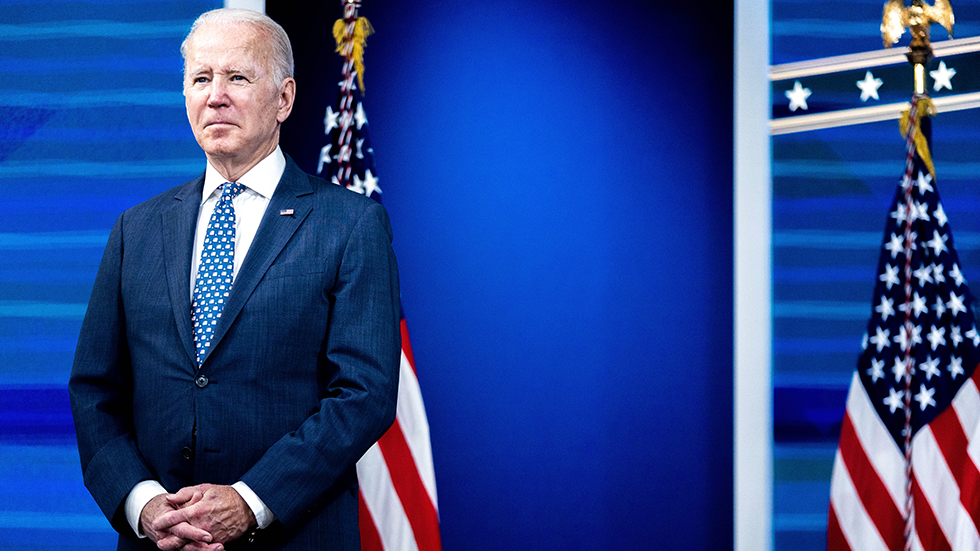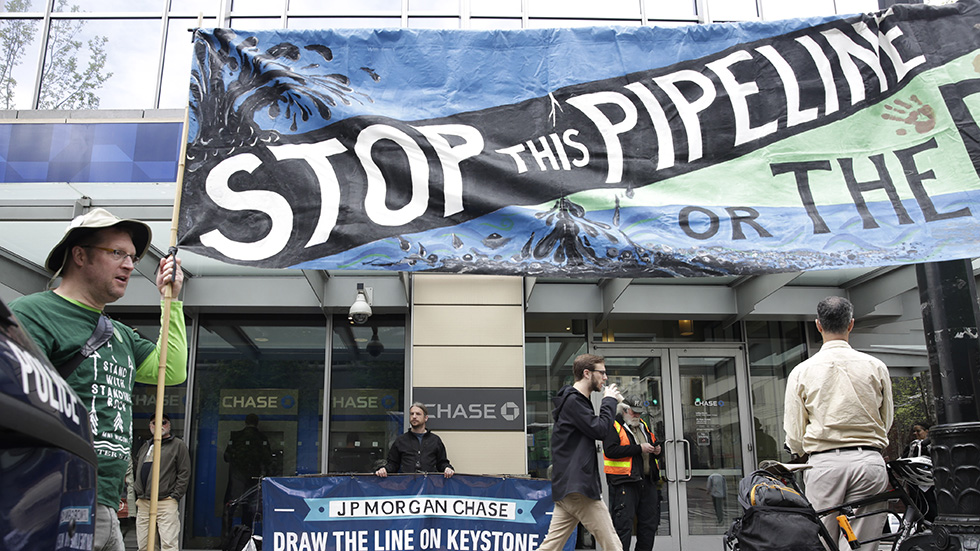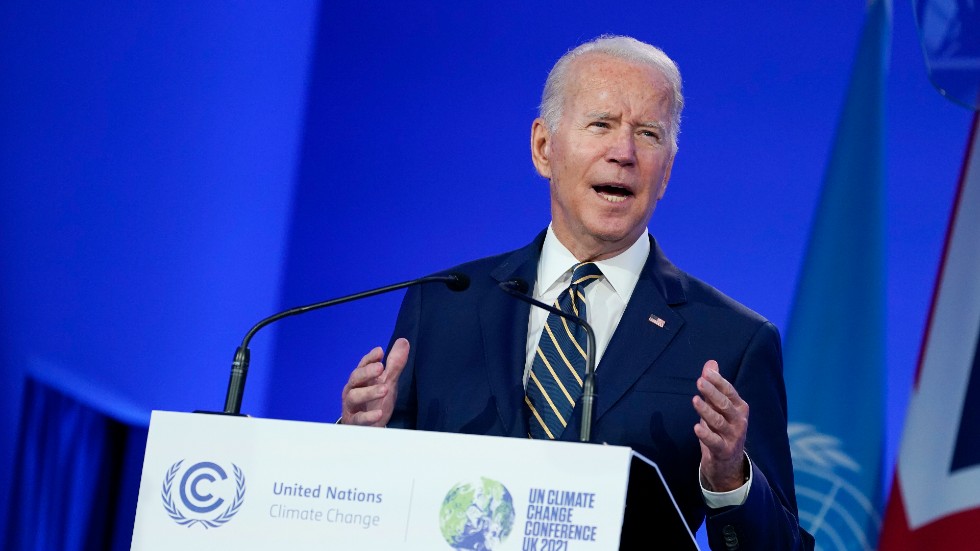Energy & Environment — The biggest climate news of 2021

Welcome to Thursday’s Overnight Energy & Environment, your source for the latest news focused on energy, the environment and beyond. Subscribe here: digital-stage.thehill.com/newsletter-signup.
Programming note: There will be no Overnight Energy, tomorrow, Dec. 31. We’ll be back on Monday. Happy New Year!
For The Hill, we’re Rachel Frazin and Zack Budryk. Write to us with tips: rfrazin@digital-stage.thehill.com and zbudryk@digital-stage.thehill.com. Follow us on Twitter: @RachelFrazin and @BudrykZack.
Let’s jump in.
Biden comes in with a bang

The presidential transition was a turning point for climate policy as the country shifted from a president who called climate change a “hoax” to one who named combating global warming as one of his top priorities.
In his first week in office, Biden made many climate moves. He recommitted the U.S. to the Paris climate agreement — from which his predecessor withdrew. He also revoked a key permit for the Keystone XL pipeline — eventually leading to the project’s cancellation and halted leasing Arctic National Wildlife Refuge.
Days later, he also implemented a contentious pause on new oil and gas leasing while the Interior Department reviews its oil and gas drilling program on federal lands.
US REGIONS GRAPPLE WITH EXTREMES
Extreme weather dominated the news early in the year as a major winter storm knocked out Texas’ self-contained power grid and caused dozens of deaths. The Electric Reliability Council of Texas (ERCOT), the grid operator for most of the state, was widely criticized for failure to prepare it against winter weather, and CEO Bill Magness was removed by its board soon after.
Months later, the Pacific Northwest also found itself unprepared for extreme temperatures. Like Texas, much of the region is unaccustomed to such weather, and many homes are without air conditioning. In August, Olympia, Wash., set a dryness record of 56 days during a period when a total of 15 large fires were burning across the state.
Portland saw three consecutive days of record-high temperatures and briefly suspended its streetcar and light rail services due to heat so extreme it melted cables. In late June, Seattle saw a then-record temperature of 107 degrees.
Also over the summer, Hurricane Ida made landfall in Louisiana before turning northeast, causing an estimated $65 billion worth of damage.
US sets big 2030 emissions goals

Just in time for Earth Day, President Biden announced the U.S.’s interim climate goal for 2030: cutting emissions by 50 to 52 percent when compared to 2005 levels. Many environmentalists lauded the goal as ambitious, while others said they had hoped for an even more ambitious goal.
The announcement came during a White House climate summit, which was virtually attended by many world leaders, including China’s Xi Jinping and Russia’s Vladimir Putin.
Biden’s announcement came as he seeks to reassert U.S. leadership on climate, and put pressure on the administration to move toward policies that will make it a reality.
Green groups pan lack of action on pipelines

Although President Biden shut down the Keystone XL pipeline on his first day in office, he has taken no action on two other pipelines: the Dakota Access Pipeline and the replacement of Line 3 of Enbridge’s pipeline in Minnesota.
Both pipelines drew numerous protests from environmentalist and Indigenous rights groups, who argued they would disrupt their local environments as well as pose broader risks.
The Justice Department has defended the permitting process for Line 3, which took place during the Trump administration.
The construction was eventually completed this year.
The administration and a federal court both declined to shut down the Dakota Access pipeline, although an appeals court ruled at the beginning of the year that the government must conduct a full Environmental Impact Statement for the project.
“President Biden campaigned and was elected on the boldest climate platform ever. Minutes after being sworn in, Biden began taking real, meaningful climate action,” Sierra Club Director Michael Brune said in a statement in April after the administration declined to halt the pipeline.
“Yet, President Biden’s actions today fail to live up to the climate and Tribal commitments he made, nor is it in line with the bold action he has taken since taking office.”
NEW EMISSIONS, MILEAGE STANDARDS
The Biden administration took steps to strengthen vehicle emissions loosened during the Trump administration, as well as proposed mileage standards, which are expected to push the market toward electric vehicles.
Over the summer, the Biden administration also indicated that it would pursue longer term standards for light- and medium-duty vehicles, and set the goal of making half of new U.S. vehicle sales in this country electric by 2030.
Meanwhile, automakers also unveiled electric vehicle goals of their own, like GM, which pledged to have an all-electric light-duty fleet by 2035 (and who could forget that Superbowl ad?).
In another Trump-era reversal, the administration has also taken steps to reinstate California’s authority to set its own vehicle tailpipe emissions standards, with the Transportation Department finalizing its part of the action last week, while the EPA’s work is still ongoing.
A tale of two bills

Earlier this month, Sen. Joe Manchin (D-W.Va.) said he would not support the Build Back Better infrastructure package that Biden has made central to his agenda.
The package contains a number of ambitious climate provisions, including a tax credit for union-made electric vehicles and a Civilian Climate Corps, and a Republican takeover of the House of Representatives would likely close the door on those goals for years.
Manchin objected specifically to some of the measure’s climate and energy provisions, saying he would not back either the union EV credit. He was also the impetus for the removal of the Clean Electricity Performance Program, which would have subsidized electric utilities transitioning to renewable energy.
Some environmentalist advocacy groups have expressed hope that the signature legislation, and its climate provisions, may be salvageable.
“I do think that the negotiations can continue. And I also think that we have to get to ‘yes’ ” said Melinda Pierce, legislative director for the Sierra Club, said earlier this month.
In the meantime, the smaller bipartisan infrastructure bill Biden signed into law in November contains a number of climate provisions as well:
- $50 billion for weatherization and resilience funds
- Increased funding for the Federal Emergency Management Agency’s disaster response
- $7.5 billion for building out electric vehicle charging station infrastructure,
- $1 billion for the backlog of federal Superfund sites.
But the implementation of the smaller infrastructure bill will be key to its climate impacts. A study released in December indicated it could increase carbon emissions if its surface transportation funds are used to expand highways rather than road maintenance.
CHANGE ‘UNEQUIVOCALLY’ CAUSED BY HUMANS
A report issued in August from the UN’s Intergovernmental Panel on Climate Change said that it’s “unequivocal” that human influence has warmed the planet.
This is a step up from the panel’s 2013 report which said “It is extremely likely that human influence has been the dominant cause of the observed warming since the mid-20th century,” giving a much greater degree of certainty of the human impacts of climate change.
The report also gave severe warnings, including that the planet is likely to have warmed by 1.5 degrees celsius this century, a key Paris Agreement benchmark for avoiding the worst impacts of climate change — but said it’s possible to reduce that warming by the end of the century if the world can start reducing more greenhouse gasses than it’s emitting.
And, it warned that as the Earth heats up, climate change will increasingly be seen in heat waves, more frequent and intense precipitation and droughts — as well as sea level rise. But, many are already seeing climate damage today.
Exxon tape prompts congressional grilling

Over the summer, Greenpeace U.K. released an undercover recording in which Exxon lobbyist Keith McCoy said the oil giant had “[fought] against some of the science” on climate change. McCoy, who believed he was talking to a corporate headhunter, also suggested the company’s backing of carbon pricing was a PR move and such a policy was unlikely to ever be implemented.
While Exxon disavowed McCoy’s comments, the House Oversight Committee called top executives from of four oil companies, as well as the American Petroleum Institute (API) and the U.S. Chamber of Commerce, to testify in October. The witnesses defended their handling of climate change and denied knowingly promoting questioning or denial of climate change, while Republicans on the panel used much of their time to lambaste the hearing itself.
Days later, Committee Chair Carolyn Maloney (D-N.Y.) formally subpoenaed the witnesses, demanding records and internal communications she said they failed to produce voluntarily.
Biden, Dems say America is ‘back’ at COP26

At the first UN.. climate summit of Biden’s presidency, he and other officials like Speaker Nancy Pelosi (D-Calif.) repeatedly emphasized what they said was America’s return to climate leadership. Just over a month before Manchin’s pronouncement on the infrastructure bill, they also stressed the climate benefits of the package.
“Our legislation is far reaching, ensuring that [the] future economy is greener and cleaner,” Pelosi said.
“I don’t accept the fact that America has not assumed its moral authority in all of this,” she later told press. “American is back, our president was here, there were many successes that were achieved in collaboration — not dictation or condescension — with other countries, many of whom of course were ahead of us because we had the dark period of four years preceding President Biden’s coming into office.”
Ultimately, world leaders at the summit agreed on a goal of reducing global carbon emissions 45 percent by 2030 and increasing funding to the developing world for climate resilience.
And, for the first time, the agreement mentioned fossil fuels, though this language was eventually watered down to calling for a “phasedown” of unabated coal instead of a “phaseout.”
Environmentalists, however, said the agreements fell short of what is necessary to avert major warming. Swedish activist Greta Thunberg, who was part of a demonstration outside the conference, told The Washington Post the summit was a “PR event.”
COP26 “doesn’t mean anything unless that actually leads to increased ambition and if they actually fulfill those ambitions,” she said.
TO LEASE OR NOT TO LEASE, THAT IS THE QUESTION
On Black Friday, the Biden administration released a report detailing its long anticipated recommendations for reforms to oil and gas drilling on federal lands and waters.
The report left both Republicans and many environmentalists unsatisfied, recommending increases for the fees that companies pay to drill on public lands, but falling short of President Biden’s call for “banning new oil and gas permitting on public lands and waters.”
Meanwhile its timing drew comparisons to the Trump administration, which dropped a major climate change report on Black Friday in 2018.
The lease came after the administration reviewed the federal program (and was initially slated for “early summer”). During much of this time, it paused new federal lease sales for oil and gas drilling, until a judge temporarily blocked it following lawsuits from Republican-led states.
Then, the administration moved ahead with a sale that offered up 80 million acres in the Gulf of Mexico for lease, drawing ire from environmental groups who opposed it.
WHAT WE’RE READING
- This tree has stood here for 500 years. Will it be sold for $17,500? The Washington Post reports
- After the Wars in Iraq, ‘Everything Living is Dying,’ Inside Climate News reports
- ERCOT: Power generators ‘ready’ if another freeze sweeps Texas, The Houston Chronicle reports
- Wind-driven wildfires prompt evacuation order for Colorado town of 13,000, Reuters reports
- Dire drought conditions dominate Utah’s environmental landscape in 2021, KUER reports
ICYMI
- Germany will likely miss 2022 climate targets, official says
- Rising gas price projections complicate Biden’s horizons
And finally, something offbeat and off-beat: Capybaras enjoy their baths.
That’s it for today, thanks for reading. Check out The Hill’s energy & environment page for the latest news and coverage. We’ll see you Monday!
Copyright 2023 Nexstar Media Inc. All rights reserved. This material may not be published, broadcast, rewritten, or redistributed. Regular the hill posts







